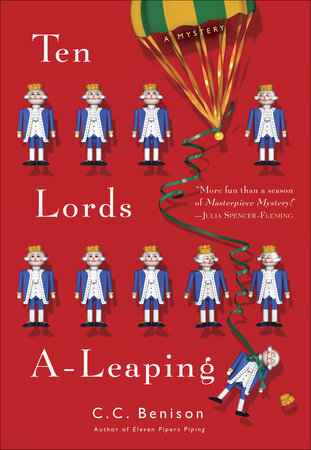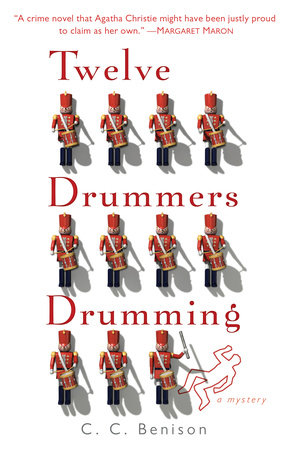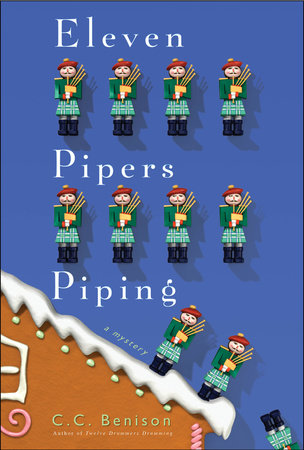Excerpt
Ten Lords A-Leaping
chapter one
“The things I do for the Church of England,” Tom murmured, thinking he might as well have shouted it aloud. One could barely hear a thing anyway what with the fearsome roar. He could hear his heart crashing in his chest, though. It sounded like a big bass drum, accompanied by a simmering tintinnabulation along the fibres of his nerves, and he rather wished he could exercise some control over it—but he couldn’t. The messy, squashy, beaty thing was coursing inexorably to a horrible bursting point. He would surely die before it was his turn. He would leave his daughter fatherless. It was too cruel. Miranda was already motherless.
His eyes raced around the fuselage with its great girdling ribs. The belly of Jonah’s whale would have seemed like this, if the beast were aluminium and tore through the air at alarming speed. As a calming strategy, as the queue shuffled towards the beast’s open jaws—to doom, surely—he focused his attention on the back of Mark’s head, which was squashed into a leather helmet reminiscent of a Roaring Twenties aviator farce. Mark Tucker, faithful husband, young father, brilliant accountant, budding novelist, the best church council treasurer a priest could have. What if something unthinkable happens? How will I ever bear Violet’s reproach? Those fearsome pinprick eyes of hers.
But Violet was young. She could marry again. Mark would have set her up nicely with insurance. Her rich in-laws doted on her. She was not without education. She could find work, keep herself occupied. Oh, it would be dreadful at first. Too, too dreadful. The grief, the pain. He knew these things. But time heals. It does. She would carry on. You do, don’t you. Well, don’t you?
What have I done?
This is all my doing, Tom thought. I’m the one who pressed for this. But it seemed the right thing at the time. Anything to avoid years’ worth of bring-and-buys and carboot sales and karaoke nights to raise funds for church repairs. Something that would bring the cash in a flash. It’s always such a bore lying awake at night worrying more about stones than souls. And it would be enormously satisfying to rid St. Nicholas’s churchyard of that ghastly plywood thermometer. It insulted him every time he walked up the pea shingle path to the church, with its sad little red plastic capillary and its unaccountably inelegant hand lettering. He had fought members of his church council against having such a thing set up by the north porch, and had lost. If funds raised from today’s event proved insufficient, well . . . The village had among its citizens a lovable kleptomaniac. Perhaps it had a likable arsonist.
The queue shuffled forwards. Tom stared past Mark’s shoulder towards the gaping portal. Strong light, undifferentiated and cold, seemed to pour towards him and sear his startled eyes. Might this be what our moment of death is like? One of his parishioners in Bristol had described it thus, urgently, wonderingly, in a state of euphoria as she faded in and out of consciousness on her deathbed. The light, Father, the light! she’d rasped, her fingernails digging into his palm. I can see Our Lord, oh! And, look, is that Ivor Novello?
Mark bent forwards slightly, and what greeted Tom’s eyes, try as he did to look away, was neither beckoning Jesus nor disoriented matinee idol, but tidy tiny patches of warm greens and golds knitted together like a fancy patchwork coat. How delightful! Heaven might look exactly like Devon. And look, off in the distance, the patterns of colour merged into a crease of soft grey brushed by a transcendent haze. Wasn’t that . . . ? My God, it was! The Channel! How high in the air were they?
And then there was a terrible shout and Mark vanished. Tom shuffled forwards, to the head of the queue, into the full ring of light, and said a silent prayer. Now it was his turn. Blood roared in his ears; his heart swelled in his chest.
7
Some little time passed—really, very little time (plunging through the ether did rather tend to play havoc with time)—when it dawned on Tom that all might not be kosher. Not frighteningly, horrifyingly not kosher. More worryingly, troublingly not kosher.
He had done everything as he ought to have done, as instructed by their skydiving teacher at the airfield. When the jumpmaster next to the door of the airplane roared at him the “go” command, the fear that had punctuated his waking thoughts for the last week, the fear that had grown through their four hours of on-ground instruction, the fear that had gripped him in the fuselage of this airplane, had hurtled to a crescendo. His heart leapt into his throat like a flapping fish and in a blinding moment of panic he’d seized the frame of the door like grim death. But the jumpmaster gently tapped his shoulder. It felt like an angel’s grace, and his fright ebbed. He vaulted into the sky, somersaulted, gaped with wonder at the dome of hard blue and wispy white, and—he astonished himself entirely—felt a mighty whoop exit his throat as the adrenaline terror coursing along his veins turned to joy and he embraced the wildness of the moment. Air rushed past his popping ears—a new roar—as he executed his opening stance—legs up high behind, back arched, back up—while he tumbled. He was upside down in the sky! And then, in a second, he was facing the horizon, gasping as the line between earth and sky seemed to rise higher and higher and higher. Yet oddly, he felt suspended, held in place only by the whipping wind that pressed against his body.
The free fall was over in a seeming instant. Novices, he and the other villagers weren’t as high in the sky as the Leaping Lords would soon be. Tom pushed down on his rip cord, felt a sudden tug along his body, and heard the distinctive whump! of rushing air suddenly trapped. It was exultation. His whole body lifted into the sky as air filled the cells of his canopy. The feverish rush of noise and wind stopped. The thrumming in his veins settled into a giddy groove as a kind of peace flowed through, above, and around him. All was silent but for the hum of the vanishing airplane, above, and the popcorn pops of other opening chutes. Thin clouds hovered over the Channel, he noted as he pulled at his steering toggles, but over this patch of Devon the sky was clear, allowing an unimpeded view of the collage of fields, ripe with golden grain this early August, of the dark green coombes riven by streams glittering in the sunlight like tinsel thread, and of the snug groupings of houses, their slate roofs turned to flashing planes of silver. Below him, too, like flowers flung from a balcony, fluttered the bright canopies of the other skydivers from the village who had risen—bless them all—to this sponsored fund-raising challenge: eager Mark, for instance, who had needed no persuading; tentative Roger Pattimore, who had strained to lose a stone to come below the maximum allowable weight; undaunted Jeanne Neels, who wouldn’t let being born with one hand stop her; octogenarian Michael Woolnough, untroubled by his advanced age—all of them members of his parochial church council, the entirety of which, but for one, signed on for the adventure, along with forty more from Thornford Regis.
Tom tugged his right strap, sending him in a gentle twirl. Puzzled, though not concerned, he wondered a little that no one—in the air or on the ground—had tried to communicate with him on his squawk box, the radio nestled above his chest strap. Jumper Number Nine, you should be preparing to land, or the like. Most likely he was doing so splendidly, no one felt obliged to correct him. Really, once you’d got past the stomach-churning bit of leaping from an airplane at thirty-five hundred feet, it was all a bit of a lark. He was starting to feel assuredly old-hand at it as he floated downwards, the earth and all its charms sharpening in delineation. He could clearly make out now the dark E-shape that was Eggescombe Hall and the pale circle of its forecourt with two roads leading from it like shoots on a sprouting bean gently winding and disappearing into a thicket of greenery. And there, to the east of the Hall, on a little hillock, was the famous Eggescombe Labyrinth, intricate and meticulous as if a sky god had pressed his signet ring into the soil.
Or was it west?
Tom felt himself vaguely disoriented as he circled around, more quickly now. Yes, the Labyrinth was east. That was Dartmoor to the north. The transition from lush pasture and woodland to bleak tableland never seemed so abrupt as it was from this bird’s-eye view. It was as if two worlds had collided with each other, knitted only by a silver seam that was surely Eggesbrooke, one of the streams rising on the moor. Westwards he twisted. Was that a stable block? And that the kitchen garden? That large irregular shape had to be the dower house. And what was that gorgeous turquoise lozenge glittering so blindingly in the middle of the lawn? He couldn’t tell, he was corkscrewing east again, now able to make out what had to be the Gatehouse and its forecourt, and there, a little farther east down a licorice strip of road, a cluster of cottage roofs and miniature gardens, and one square Norman church tower—evidence of the tiny village of Abbotswick.
North and westwards again, he noted the irregular mosaic of parkland and gardens cede to one large lawn, on which someone—one of Lord Fairhaven’s staff presumably—had chalked a fat Greek cross, white on green. The parachutes beneath him were streaming towards it like obedient geese.
The cross was his destination, too, the place of safe landing. At one arm of the cross was an elevated wind sock, its narrow end stiffened easterly by the west wind blowing off the Atlantic. This was his beacon and guide. He must loop around, steer into the ground wind, as indicated by the sock, and prepare to glide smoothly towards the target to make a soft landing. Like stepping off a step, their instructor had said in his reassuring voice. Tom glanced at the altimeter on his left wrist as Eggescombe Hall and its outbuildings fell behind him and he swooped down towards the expanse of the western lawn, feeling the earth rise to greet him with a sudden and unexpected force. The sweet tranquility of the canopied descent had somehow confounded time’s ineluctable passage. He was two hundred feet nearer the ground than he had imagined he was. It was here, at this height, that he was to prepare to land, to “flare,” as the instructor had said, to make his final approach in such a fashion as to ensure comfort and safety. It was here, too, that his squawk box was to intrude with voice commands to ease the novice’s final descent. But where is the voice?
“Hello,” he addressed the box, concern giving over to alarm. “Hello? Jumper Number Nine here awaiting instructions . . . Hello?”
The thing was mute.
It was then Tom realised something was awry. Something was worryingly, troublingly not kosher.
He wasn’t being ignored. The radio was dead.
The ground loomed up faster, no pleasant pasture now. The instructor’s directives flew, half remembered, into Tom’s brain: Take toggles at shoulders, pull down to breastbone, turn your wrists to your body and push the toggles between your legs in a smooth motion. Yes, he thought with giddy relief, he would make the target, not go hurtling into a hedgerow or drop onto the gorse-covered, rock-strewn moor. Yes, he was slowing, but now he felt little gentleness in his approach. The solid unforgiving earth seemed poised to open and swallow him. From the corners of his eyes, he could see a few who had already landed, jumpsuited, stopping in the scooping of their nylon canopies, staring up at him, helpless in the face of danger.
And now, heart again surging into his throat, eyes horrified to see individuated blades bloom in the chalky grass, he quickly lifted his legs behind him in the approved manner, then as quickly extended them, set to land first on the balls of his feet, to absorb the shock. But the ground raced to meet him with astonishing fury. As his feet grazed the armour of the soil, he felt only helpless surprise at his contorting, ungovernable body. His landing turned collapse. Something buckled and twisted. He sensed injury before his brain registered it and when it did, it came as the purest, brightest burst of pain.






